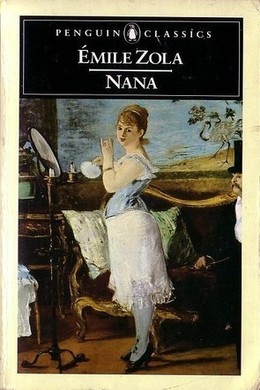
-
EPUB 577 KB
-
Kindle 812 KB
-
Support epubBooks by making a small $2.99 PayPal donation purchase.
Description
Prompted by his theories of heredity and environment, Zola set out out to show Nana, the golden fly, rising out of the underworld to feed on society–a predetermined product of her origins. Nana’s latent destructiveness is mirrored in the Empire’s, and they reflect each others’ disintegration and final collapse in 1890.Built around the book’s scientific skeleton is a powerful, sensual atmosphere and a rich use of words which elevate the novel beyond the realistic platform into a poem of male desires.
829 pages with a reading time of ~12.75 hours (207434 words), and first published in 1880. This DRM-Free edition published by epubBooks, 2015.
Community Reviews
There are currently no other reviews for this book.
Excerpt
At nine o’clock in the evening the body of the house at the Theatres des Varietes was still all but empty. A few individuals, it is true, were sitting quietly waiting in the balcony and stalls, but these were lost, as it were, among the ranges of seats whose coverings of cardinal velvet loomed in the subdued light of the dimly burning luster. A shadow enveloped the great red splash of the curtain, and not a sound came from the stage, the unlit footlights, the scattered desks of the orchestra. It was only high overhead in the third gallery, round the domed ceiling where nude females and children flew in heavens which had turned green in the gaslight, that calls and laughter were audible above a continuous hubbub of voices, and heads in women’s and workmen’s caps were ranged, row above row, under the wide-vaulted bays with their gilt-surrounding adornments. Every few seconds an attendant would make her appearance, bustling along with tickets in her hand and piloting in front of her a gentleman and a lady, who took their seats, he in his evening dress, she sitting slim and undulant beside him while her eyes wandered slowly round the house.
Two young men appeared in the stalls; they kept standing and looked about them.
“Didn’t I say so, Hector?” cried the elder of the two, a tall fellow with little black mustaches. “We’re too early! You might quite well have allowed me to finish my cigar.”
An attendant was passing.
“Oh, Monsieur Fauchery,” she said familiarly, “it won’t begin for half an hour yet!”
“Then why do they advertise for nine o’clock?” muttered Hector, whose long thin face assumed an expression of vexation. “Only this morning Clarisse, who’s in the piece, swore that they’d begin at nine o’clock punctually.”
For a moment they remained silent and, looking upward, scanned the shadowy boxes. But the green paper with which these were hung rendered them more shadowy still. Down below, under the dress circle, the lower boxes were buried in utter night. In those on the second tier there was only one stout lady, who was stranded, as it were, on the velvet-covered balustrade in front of her. On the right hand and on the left, between lofty pilasters, the stage boxes, bedraped with long-fringed scalloped hangings, remained untenanted. The house with its white and gold, relieved by soft green tones, lay only half disclosed to view, as though full of a fine dust shed from the little jets of flame in the great glass luster.
“Did you get your stage box for Lucy?” asked Hector.
“Yes,” replied his companion, “but I had some trouble to get it. Oh, there’s no danger of Lucy coming too early!”
He stifled a slight yawn; then after a pause:
“You’re in luck’s way, you are, since you haven’t been at a first night before. The Blonde Venus will be the event of the year. People have been talking about it for six months. Oh, such music, my dear boy! Such a sly dog, Bordenave! He knows his business and has kept this for the exhibition season.” Hector was religiously attentive. He asked a question.
“And Nana, the new star who’s going to play Venus, d’you know her?”
“There you are; you’re beginning again!” cried Fauchery, casting up his arms. “Ever since this morning people have been dreeing me with Nana. I’ve met more than twenty people, and it’s Nana here and Nana there! What do I know? Am I acquainted with all the light ladies in Paris? Nana is an invention of Bordenave’s! It must be a fine one!”
He calmed himself, but the emptiness of the house, the dim light of the luster, the churchlike sense of self-absorption which the place inspired, full as it was of whispering voices and the sound of doors banging–all these got on his nerves.
“No, by Jove,” he said all of a sudden, “one’s hair turns gray here. I–I’m going out. Perhaps we shall find Bordenave downstairs. He’ll give us information about things.”
